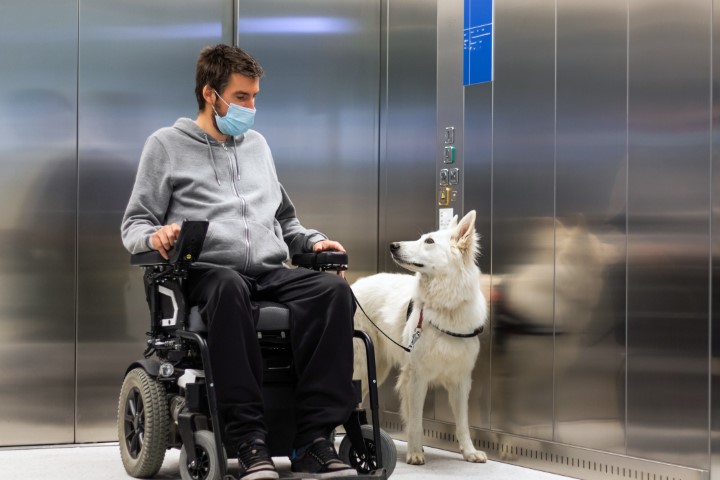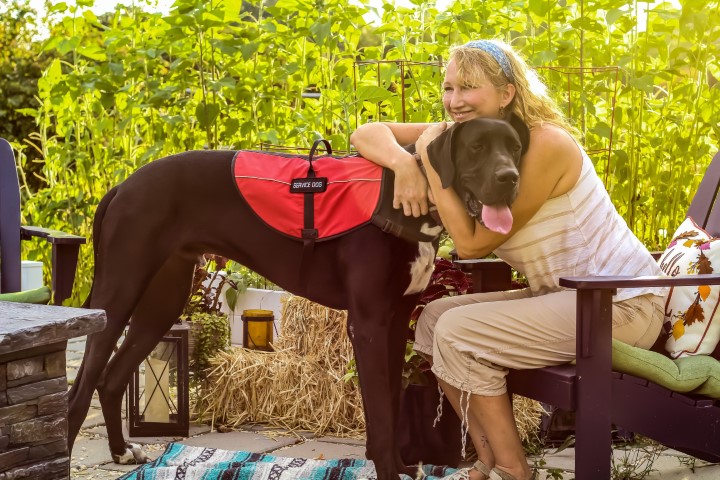Master Trainer Course in Service Dog Training
Learning how to become a service dog trainer can lead to a rewarding new phase in your career. Training a service dog goes far beyond what most people term “obedience training,” so further education is required. Taking a master training course to become a certified service dog trainer allows you to branch out professionally while helping people with disabilities.
Service dogs need intensive training that can last up to two years. Trainers need to master the skills needed to teach the complex tasks required of service dogs. Some dogs even have to learn life saving behaviors, such as seeking help for a handler during a medical emergency.
Public access is an enormous part of service dog training. Dogs must be able to handle any situation without losing focus on their handlers. Service dogs need to demonstrate the ability to remain calm and nonreactive in a wide variety of situations in order to help their handlers safely navigate the world. Service dogs can never be disruptive or unruly in public, and trainers must work hard to expose and desensitize them to all kinds of distractions and potentially frightening situations.
Depending on the handler, dogs may have to learn to ignore other animals, crowds, or loud street noises. Some may have to lay quietly in tiny spaces under seats on trains and airplanes or under a desk. They must remain focused on their job no matter what’s going on around them.
Prerequisites for Enrollment into the Service Dog Training Program
The ABC Service Dog Trainer Program is intended for students who have a clear understanding of dog behavior and adhere to the LIMA (least intrusive, minimally aversive) training philosophy. If you do not already have this level of educational training, we encourage you to enroll in our Dog Obedience Program which can be found here.
Enrollment into this program requires all students to possess a high school diploma or equivalent.
In addition, students must qualify for enrollment in our Service Dog Training Program by meeting either the minimum education requirement or the minimum experience requirement established by ABC. Students must meet one or the other.


Option One – Minimum Education Requirement for Enrollment –
If you are credentialed as a dog trainer by an ABC recognized dog training school or dog training organization you will likely meet the education requirement.
Examples include:
- Animal Behavior College – (e.g., ABCDT, ABCDT-L2)
- Animal Behavior Institute (e.g., CACTP)
- Catch Academy (e.g., CCDT)
- Certification Council for Professional Dog Trainers – (e.g., CPDT-KA, CPDT-KSA)
- International Association of Animal Behavior Consultants – (e.g., IAABC-ADT)
- International Association of Canine Professionals – (e.g., CDT, CDTA)
- Karen Pryor Academy – (e.g., KPA CTP)
- National Association of Dog Obedience Instructors – (e.g., NADOI Certified Member)
- National K9 Learning Center (e.g., CPT)
- Penn Foster (Dog Obedience Trainer/Instructor Graduate)
- Tarheel Canine (e.g., Graduate from one of their professional obedience courses)
- Triple Crown Dog Academy/Starmark Animal Behavior Center (e.g., Graduate from their basic obedience course)
- Victoria Stillwell Academy (Graduate from their Dog Trainer Course)
- A certification in any ABC-recognized animal behavior/training program
- A degree in animal science or another animal behavior related field
If you have graduated a dog training program from a school not listed or are a credentialed dog trainer through an organization not listed, please contact us directly at 800-795-3294 to discuss. We may make exceptions on a case-by-case basis.
For students that do not meet the above educational requirements, you may still be eligible for enrollment by meeting the experience requirements below.
Option Two – Minimum Experience Requirement for Enrollment
- At least 275 hours of dog training experience within the last three (3) years. The 275 minimum hour requirement includes hours doing the following:
- Instructing group dog training classes, private lessons, board and train lessons, or virtual training sessions with people and their dogs.
- Attending continuing education classes/seminars in the field of dog training
- Volunteering at a shelter training dogs or serving as a volunteer training assistant in shelters
- Preparing and implementing curriculum and lessons plans for clients.
- Preparing client homework assignments.
As a condition of enrollment, ABC reserves the right to verify your education or experience. Be prepared to present documentation of your education or experience if requested by ABC.
If you do not meet the education or experience requirements, consider enrolling in our Dog Obedience Program and becoming an ABCDT. Click here for more information.




